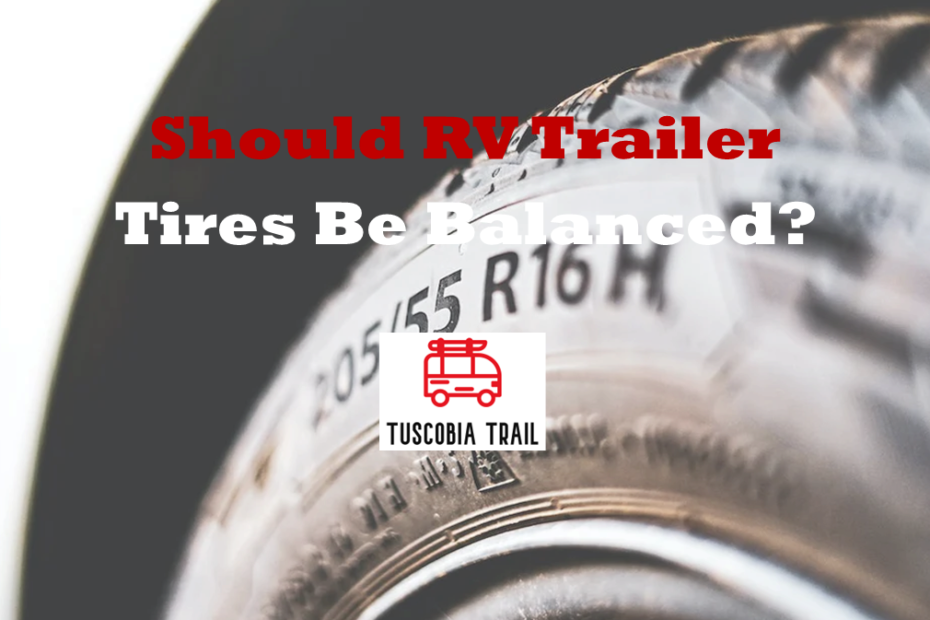RV owners often wonder about the necessity of balancing their trailer tires. RV trailer tires should be balanced for a number of reasons.
While not mandatory, balancing RV trailer tires can significantly enhance your travel experience and protect your investment.
Some of the benefits of tire balancing your RV can be found below as well as some essential information for RV owners wanting to know more about the subject.
Why Balance RV Trailer Tires?
Balancing your RV trailer tires offers several advantages from preserving the lifespan of your tires as well as saving money on fuel bills.
Balanced tires wear more evenly, prevent premature wear and there extend their lifespan longer then tires that haven’t been balanced.
Proper balancing minimizes vibrations, protecting your cargo and trailer components as well as making for a better ride while living and travelling in your RV.
Balanced tires also provide better stability and control, enhance safety and reduce the risk of accidents while on your travels.
Probably the most important if you move around a lot in your van, well-balanced tires decrease rolling resistance and potentially improving fuel economy and save you dollars.
Understanding Tire Balancing
Tire balancing involves evenly distributing weight around the wheel. This process typically uses a machine that spins the tire to measure centrifugal force and adds weights to compensate for any imbalances.
Identifying RV Trailer Tires
RV trailer tires are usually categorized as either Special Tire (ST) or Light Truck (LT). A typical tire designation might look like “ST 205/75 D14,” where:
- 205 represents the tire width
- 75 indicates the tire’s height as a percentage of its width
- D or R signifies the tire construction (bias-ply or radial)
- 14 is the wheel diameter in inches
When to Balance RV Trailer Tires
Consider balancing your RV trailer tires when installing new tires or if you notice unusual vibrations while towing.
You should look into the balance of your RV tires every 3,000 to 6,000 miles, depending on usage.
Signs of Unbalanced Trailer Tires
One of the most noticeable indicators of unbalanced trailer tires is continuous vibration in the steering wheel. This sensation typically worsens as speed increases, making for an uncomfortable and potentially unsafe towing experience.
Unbalanced tires can lead to uneven tread wear, which occurs because the weight distribution is not uniform, causing certain areas of the tire to experience more stress than others.
Excessive heat generation can be caused due to increased friction against the road surface. This overheating can damage the tire’s structural integrity and lead to blowouts, especially under heavy loads.
If you notice your trailer swaying or feeling unstable while driving, it could be a sign that the tires are unbalanced.
Excessive vibrations from unbalanced tires can cause rattling in the trailer’s structure, loosening screws, rivets, and other components over time.
Unbalanced tires are more prone to blowouts due to uneven stress distribution and overheating. A blowout can be dangerous, particularly at high speeds .
Where to Balance RV Trailer Tires
Many tire shops and RV dealerships offer tire balancing services and you will find your local garages can help.
It’s important to remember that some trailer wheels have unique designs that may require specialized equipment.
It’s best to consult with your RV dealer or a reputable tire shop experienced with RV trailers.
Tire Maintenance Beyond Balancing
While balancing is important, other factors contribute to tire health and performance.
You should perform regular inspections and check for signs of wear, damage, or dry rot, maintain recommended tire pressure to prevent overheating and excessive wear and rotate tires regularly to ensure even wear.
Consider replacing RV trailer tires every 3-6 years, regardless of tread wear in that time.
FAQs
Is tire balancing necessary for all RV trailers?
While not mandatory, balancing can improve performance, safety, and tire longevity for most RV trailers.
How often should I balance my RV trailer tires?
Consider balancing every 3,000 to 6,000 miles or if you notice unusual vibrations.
Can I balance RV trailer tires myself?
It’s recommended to have professionals balance your tires using specialized equipment for accurate results.
Will balancing tires increase my trailer’s load capacity?
No, balancing does not affect load capacity. Always adhere to your trailer’s weight limits.
What if I still experience issues after balancing?
Other factors like underinflation, overloading, or mechanical issues could be at play. Consult a professional if problems persist.
